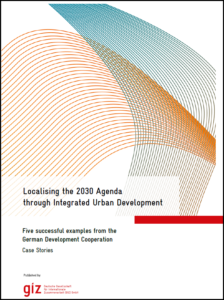Localising the 2030 Agenda through Integrated Urban Development
GIZ – Enabling Subnational Climate Action through Multi-level Governance
In the report on “Localising the 2030 Agenda through Integrated Urban Development”, the authors present a collection of case stories about the successful adaptation and implementation of an integrated urban development approach for localising the 2030 Agenda. The five projects from four different regions presented in this publication pursued an integrated approach with a varying focus adapted to the local context.
More specifically, the study describes the respective methodological approach along the four dimensions “Integration of Sectors”, “Integration of Actors”, “Integration of different levels of Government” as well as “Integration of Spaces” and highlights factors that contributed to the successful implementation of the projects including their transferability. The case stories consist of:
- The river revitalization project of the Atoyac (Puebla, Mexico), as part of the Urban-industrial Environmental Management Project in Mexico, a good example of the involvement of civil society and the private sector in complex development projects at the city-regional level.
- The Integrated Urban Development Project in Ukraine, an example for the practical implementation of the integrated and participatory guiding principle through concrete, visible and tangible measures.
- The project Improvement of Green Infrastructure in Jordan through Labour-Intensive Measures shows how a typical approach of transitional aid can promote sustainable urban development and thus create future prospects.
- The projects Land-use Planning and Sustainable Urban Development – Smart Cities in India are good examples of how inter-sectoral coordination promotes the prerequisites for an integrated approach.
- Last but not least, the construction project in Naga City (Philippines), as part of the project Integrated Resource Management in Asian Cities: the Urban NEXUS depicts how concrete solutions for inter-sectoral co-ordination illustrate the prerequisites for an integrated approach.


